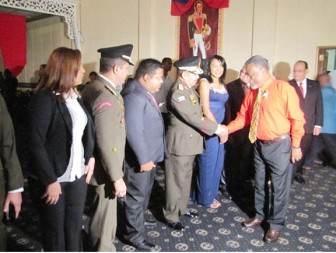Officials of both Guyana and Venezuela on Thursday evening recommitted to the Good Offices process of the United Nations Secretary General to address their border issue at the 201st observance of Venezuela’s Inde-pendence at the Pegasus Hotel, the Government Infor-mation Agency (GINA) said in a press release.
Prime Minister Samuel Hinds and Venezuelan Ambassador to Guyana Dario Morandy both made the commitment with the latter saying that it will not be an impediment to the integration of the two countries’ peoples.
“There can be no doubt that the current status of our relations is indeed unprecedented. This brotherly friendship and cooperation that exists between us today did not come by chance. It is attributed to the sustained contact and dialogue with which we have been able to achieve at the highest levels, a sincere commitment to work to strengthen our relationship through mutual respect and understanding.
“Guyana, like Venezuela, remains committed to the Good Offices process of the United Nations Secretary General,” Prime Minister Hinds is quoted as saying.
Meanwhile, Ambassador Morandy said Venezuela and Guyana’s territorial issue is a legacy of colonialism that is being discussed and will be resolved through diplomatic channels.
“It will not become an obstacle for the process of integration of our people,” the Ambassador stated.
He also reaffirmed his country’s commitment to the Geneva Agreement and the Good Offices Process.

Hinds said that July 5 embodies the struggles of Simon Bolivar for a liberated South America and noted that the states of Latin America and the Caribbean are driven by a spirit of determination and resilience, forging stronger relations amongst themselves for the economic progress of the region.
He pointed out that regional organisations such as the Union of South American Nations (UNASUR) and the Community of Latin and American and Caribbean states (CELAC) would have made Simon Bolivar justly proud.
“Guyana is committed to working with its sister Cari-com member states towards the attainment of the objectives of CELAC,” the Prime Minister said as he explained that body’s goal of continued dialogue between sister states.
Trade relations
Hinds also stated that there is potential for the expansion of trade relations in the areas of non-traditional crops and air transportation with Venezuela.
He explained that the several areas of bilateral cooperation between the two countries bear testimony to their determination to pursue activities of ultimate benefit to the people of Guyana and Venezuela.
The Prime Minister expressed the Government and people of Guyana’s appreciation for the assistance, both economic and technical, which has been forthcoming from Venezuela.
He made particular mention of the Centre of Rehabilitation and Reintegration at Onverwagt, West Berbice, which will accommodate the homeless and commended Ambassador Morandy for his personal attention to the project.
Hinds also said that the export of rice to Venezuela is unprecedented and urged that the benefits of that trade to both peoples not be underestimated. He expressed pleasure that it was this trade that enabled Guyana to fulfil the arrangement of the Petro Caribe agreement.
However, Hinds noted that there is always more that can be done to enhance relations between the two countries and improve the lives of their citizens, bringing them closer.
He paid tribute to the President of Venezuela Hugo Chavez and proposed a toast towards his health and well-being.
Meanwhile, Ambassador Morandy stated that, “this anniversary of our independence coincides with a crucial historic moment for Latin America and the Caribbean: the time for Bolivarian integration as a response to the structural crisis of economic neo-liberalism…a time of great challenges and decisions.”
Venezuela marked the 201st anniversary of its independence from Spain, with a military-civilian parade in Caracas and street parties across the country.
President Chavez inaugurated proceedings, addressing Venezuelans from the presidential palace and helped get the main parade under way with a live televised address. However, he was unable to attend the parade in person, because of ill health.
In 1521, Guyana’s neighbour was colonized by the Spanish and the first rebellion against Spanish rule took place in 1749. In 1810, Venezuelan patriots took advantage of Napoleon Bonaparte’s invasion of Spain to declare independence; the Independence Act was signed the following year, on July 5, 1811.
Simón Bolivar, known as The Liberator led 19th Century revolutionary wars against Spain, winning independence for Venezuela which then became a state of Gran Colombia. In 1829-30, Venezuela seceded from Gran Colombia and became an independent republic on January 13, 1830. The country’s independence was not recognized until March 30, 1845.
The Bolivarian Republic of Venezuela has been the country’s full official title since the adoption of the new Constitution of 1999, when the state was renamed in honour of Simón Bolívar, the release added.





